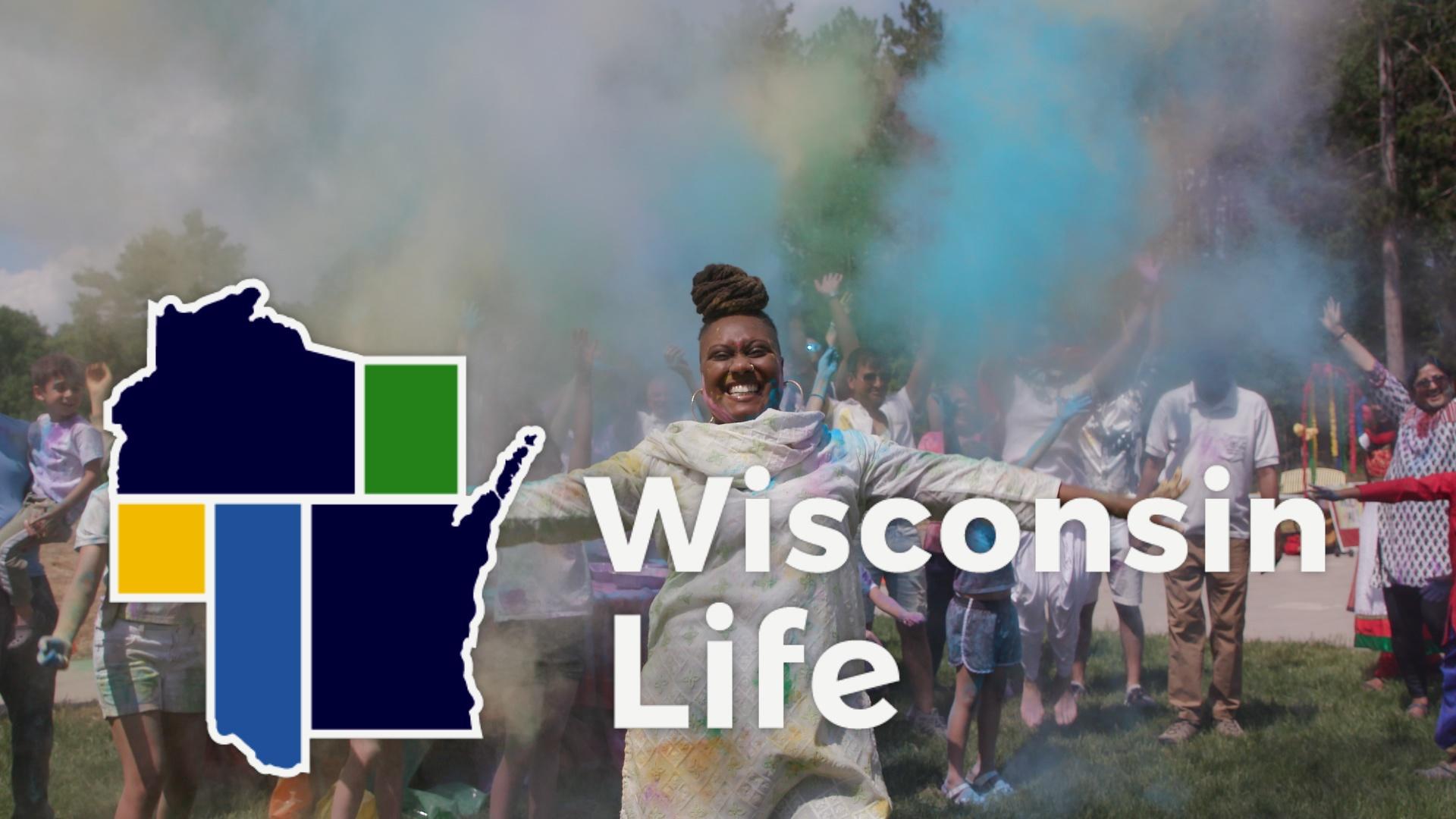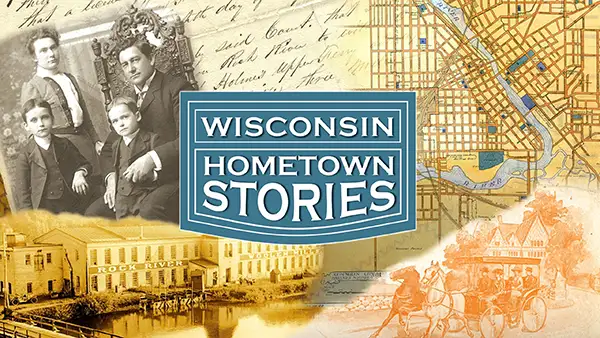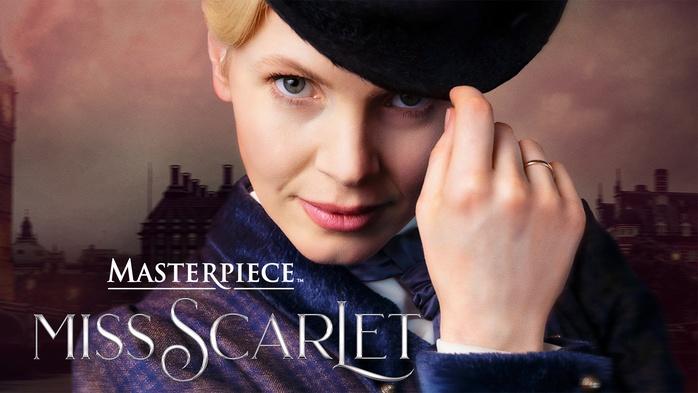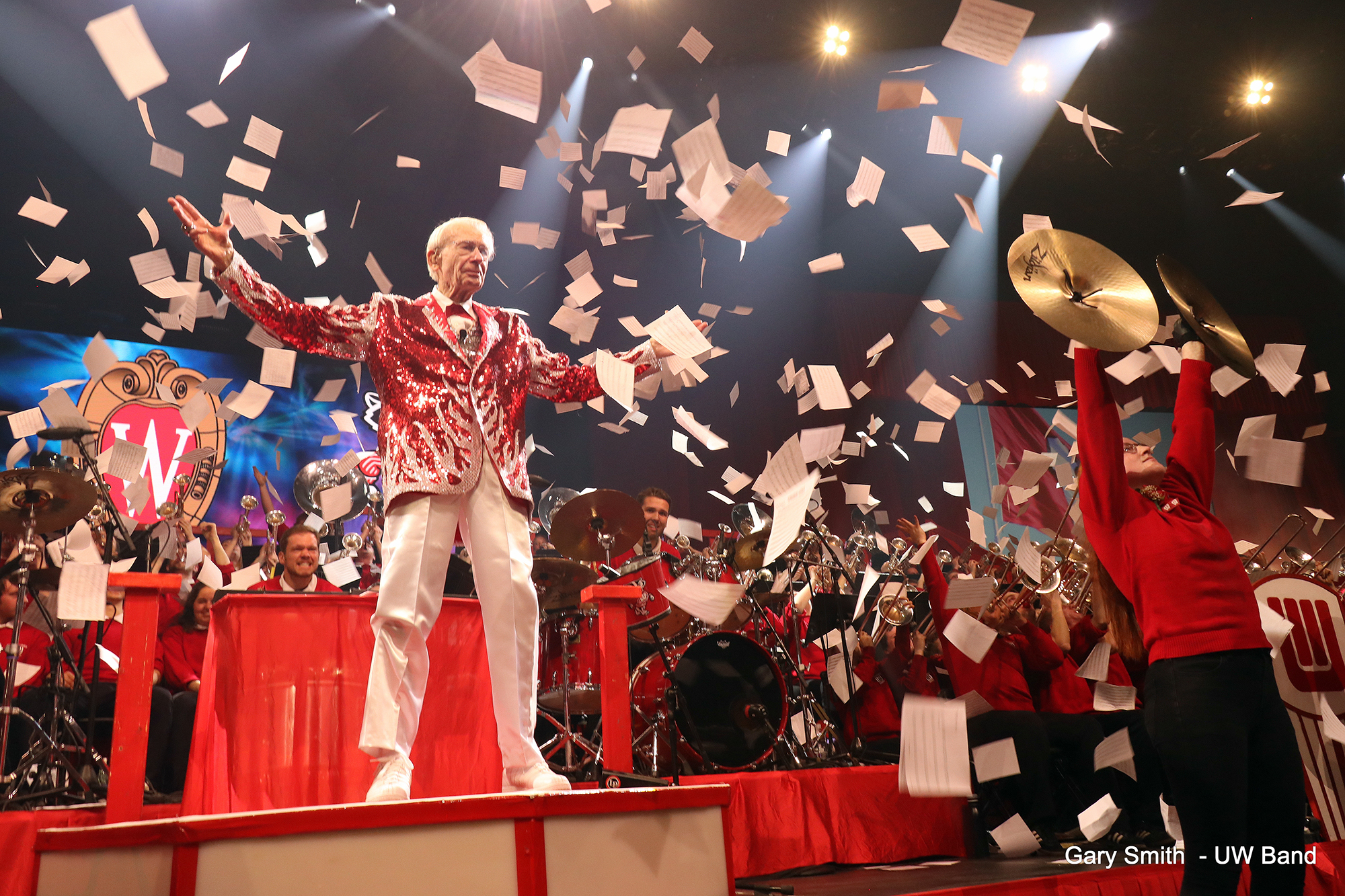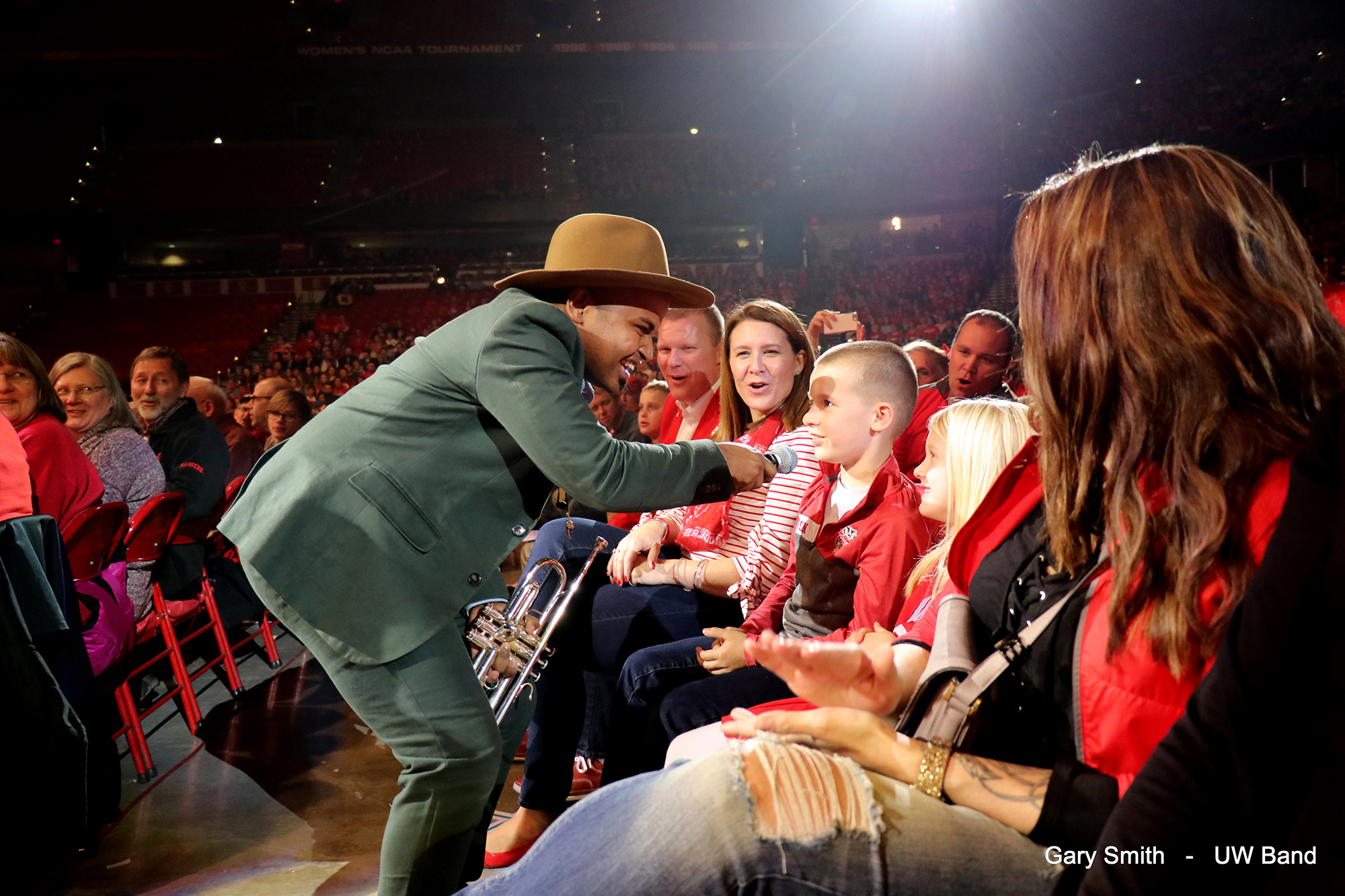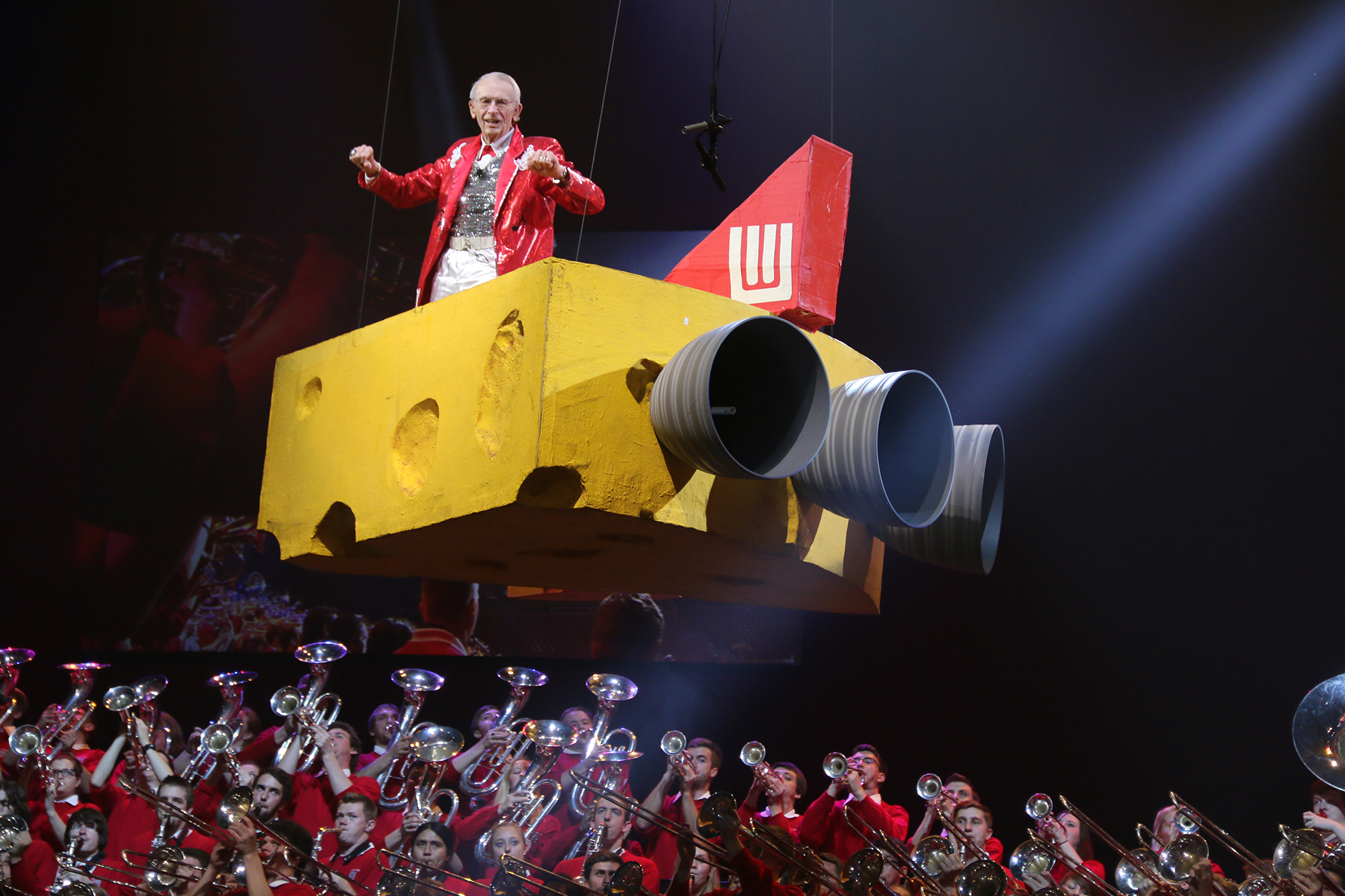Q&A: Prof. Mike Leckrone, UW Varsity Band
April 22, 2019 Leave a Comment
Over his 50-year career leading the University of Wisconsin Bands, Prof. Mike Leckrone has often spoken of “moments of happiness” – the peaks in life that make the valleys easier to bear. He’s had many of those moments at Camp Randall Stadium and the Kohl Center.
So it’s fitting that “Moments of Happiness” is the title of his final Varsity Band Spring Concert.
Watch the legendary Leckrone take his final bow at the Kohl Center 7 p.m. Saturday, May 4 on WPT, with game day favorites, the best of popular and musical theater standards and (as always) many surprises.
Leckrone took time out of his still-busy schedule to speak with us. Read his reflections – including just what he plans to do after stepping down – in our Q&A below!
What does a statewide broadcast on WPT mean for the band?
The thing that gets me is how interested people are in the band. There’s a genuine interaction I really enjoy watching.
On television, cameras can pick out things like kids dancing or marriage proposals to show on screen. That gives us that personal touch. I don’t have to change a thing about what I’m doing in the show, because it’s all in the hands of the TV director.
I’m prejudiced, but I think the band is the personification of the Wisconsin Idea. When we take a band out into the state – or on public television – you’re seeing what the band experience can offer. Showing this across the state means that people get an idea about what it is we really do.
Seeing that it’s fun, and there’s good music – to maybe expose them to some music they’ve never heard before – that’s all part of my mission.
Lots of people get the idea that performance has an end. It doesn’t. Once that performance is over, you are still going to be a performer. You will enjoy it the most if you have learned to perform at a high level, if you’re critical of your performance level. It becomes a cycle: If you enjoy it, you get to keep passing it on to other people.
How did the band concert get started?
Back in 1975, talking with the students, I said, “It’s a shame that we just end the season with a game we might or might not win. Let’s bring everybody together.” I added the real selling point: “Then we’ll have a party.”
I’m very big on the familial aspect of what the band does. And I feel it’s very important to pull it together for one last time, to have a chance to reflect on what the season was about.
The first year, we had 450-some people in Mills Hall, and I was delighted! We literally decided that night what we were going to play. We had a list of tunes we’d been playing during the football, hockey and basketball seasons, and I wrote on the blackboard: “This is what we’re playing; we’ll put an intermission here.” We turned on the lights in the auditorium; that was the extent of the technology.
People said to me after that concert, “This will be annual, right?” Naively, I said, “Sure!”
How did your famous surprises start appearing in the show – the flying, the jokes?
Part of the charm in the early years was that none of us knew what was going to happen next! It was much less scripted than it is now. I remember nights when the band had pizzas delivered in the middle of the show. One year they broke out some kind of grill and roasted hot dogs.
Those things happened spontaneously; I didn’t know they were coming. I think part of the audience’s fun was watching the kids do those things and see my reaction, and see it was college kids having a good time.
Before [aerial technicians] Flying by Foy came along, we had a local stagehand, a carpenter, who said, “I can lift you up in the air!” We didn’t have safety equipment, but he knew mechanically what he was doing.
One year I jumped off the third balcony of the Field House onto a firepole and slid my way down to the stage – I’m chuckling, because I’d never do it again. I don’t know why I did it then.
That added to the fun of my planning the show. It made the audience wonder, “What’s he going to do next? What’s the band going to do next?”
Those things kept adding until the production started getting more complicated. Production people don’t like surprises.
What do “moments of happiness” mean to you?
We’ve all experienced moments of great satisfaction and great disappointment. What I say to students: try to train your mind so that when there are those moments of disappointment, unhappiness, you have a trigger that you can go to and say, “Boy, I remember how great it felt when we went to the Rose Bowl.”

Band members pose with a shoutout from their hometown of Beaver Dam at the 1994 Rose Bowl in Pasadena, Calif.
If you can pull those things back into your mind, it’ll ease the bitterness or the disappointment. You live on the moments of happiness and try to put it aside.
Everybody remembers that wonderful day you got up on a two-wheeler and took off. On the other hand, you don’t remember the countless times you had to have fallen off before you actually got up.
What kinds of features and songs represent those “moments of happiness” for this show?
Certain shows stand out as things I want to present, because they represent craftsmanship and quality. Great theater almost always transfers into great music.
I’m a great fan of Andrew Lloyd Webber – a lot of people are not, but he combines all of those aspects. You can’t deny that the artistic quality of his presentations is great. I’d kind of been putting off Jesus Christ Superstar because that’s one of those shows that will stick in your mind because you have so many associations – whether the spiritual, the religious or just simply musical.
I chose The Music Man because it’s almost autobiographical. Most kids in the band were raised with those Midwestern values, whether they came from an urban or country background.
That’s the great thing about my job. I’m working with kids that are really special. They have a broad background of what they can accomplish, and sometimes don’t understand their own limitations, which I think is good.
The Music Man has a lot of messages that I like, even to go so far as the Think Method. [chuckles] I think a lot of people’s successes are based on whether they think they can do it, as opposed to whether they are well prepared technically or academically. But if you start thinking you can do it, that’s part of what I think that philosophy is.
Jersey Boys… transcends just “rock” and has now become part of the American musical vernacular. When we do some of these tunes, I look out into the audience, and their ages don’t matter: they know the songs and can relate to them.
Describe some of your emotions these days.
People are getting tired of it, I think. [laughs] “Can we do this without handing out another plaque to Leckrone?”

Presenting a “Leckrone 50” jersey at a UW football game are Chancellor Rebecca Blank (red jacket) and Athletic Director Barry Alvarez (right of jersey), along with Leckrone family members.
It doesn’t seem real. I think that’s because the season never really has changed from what I remember; we’ve been going full blast with these interruptions of “By the way, this is your last time to do this.”
Particularly since I’ve announced my retirement, I’ve gotten stacks of letters and emails saying, “You changed my life.” I don’t believe I changed their lives. But I provided them with some material that they could use to change their own lives.
For somebody to say that, it’s a powerful statement. If I’ve done that, it’s more gratifying than I can express.
At the same time, I’m trying to analyze, “What did I do? Why did they say this?” I know part of that is nostalgia. But that’s great, because if they’re looking back and having those moments of happiness, that’s what I was trying to do.
What do you think you might do next?
I don’t know. It’s obvious, and it’s truthful. I haven’t had time to think about it, and, honestly, I don’t WANT to think about it. “Unfortunately,” and I put that in quotes, I’ve always been a business-as-usual guy. This is going to be a lot harder; my business is not going to be there.
I’m NOT going to play golf all the time. I’m not a golfer, I don’t go fishing, I don’t hunt, I don’t do any of those things that people would say, “That’s what normal people would do.”
But I do like to travel. I’ve already been engaged to do one of the alumni trips to Budapest, Vienna and Prague. If I like it, I may say, “I’m going to do this again soon.”

At the piano, Leckrone prepares music for the 2017 marching season, including West Side Story and Miss Saigon.
I love writing music, but the amount of time I’ve been allowed to write music has been limited. At this point, it doesn’t really matter if anybody else wants to hear it or not, but if they do, wonderful.
I love musical theater. I can see myself saying, “I’ve never seen Love Never Dies, the sequel to Phantom of the Opera. I’m going to fly to London and see it.”
Anything else you’d like to add?
I always feel remiss if I don’t mention that I couldn’t have gotten any of this done without the support of my wife.
[Phyllis Leckrone, who met her husband in the 7th grade, passed away in August 2017. Married for 62 years, the Leckrones had five children, eight grandchildren and three great-grandchildren.]
My immediate family has been great, and my band family and others have stepped up and made the loss bearable.
She never once, I felt, was saying, “I’d rather you not do that.” She probably felt it; she just never said it! That gave me a freedom to do some of the things that I probably wouldn’t and couldn’t have done. If I’ve had some success, she was… she IS a very important portion of that.
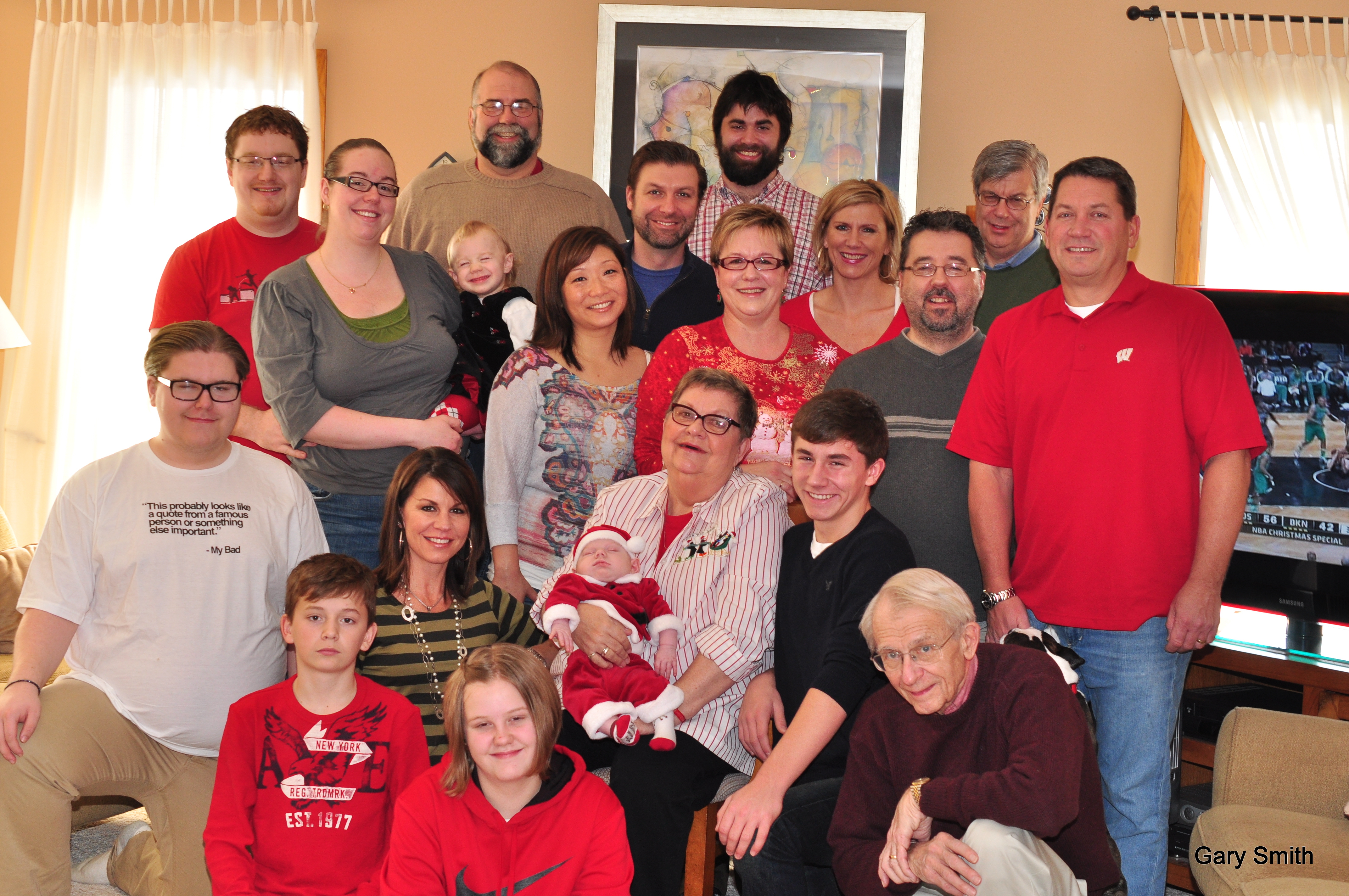
Mike Leckrone (crouching in front) and wife Phyllis (holding baby at center) pose with children and grandchildren.
Thanks to longtime Badger Band photographer Gary Smith for the many images.

Band members toss their music into the air for the final time under Leckrone at the end of Saturday’s 2019 concert.
University of Wisconsin Varsity Band Wisconsin Public Television Wisconsin Public Television University of Wisconsin Q&A UW Madison Concerts University of Wisconsin-Madison UW Varsity Band UW Varsity Band Spring Concert Mike Leckrone University of Wisconsin Marching Band
 Passport
Passport